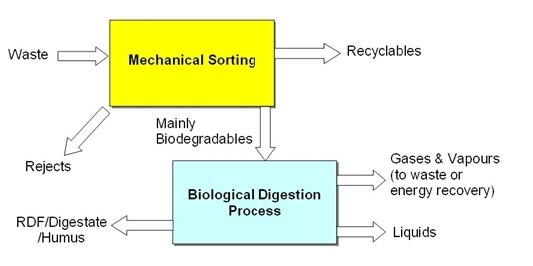Mechanical Biological Treatment
MBT stands for Mechanical Biological Treatment. It is a process that could help the UK to meet its obligations under the Landfill Directive (EC/ 31/1999), of diverting biodegradable municipal solid waste from landfill to help protect the environment and reduce the amount of greenhouse gas emitted from landfill sites.
MBT describes a number of different processes dealing with the biological treatment of waste. It is the combination of both biological and physical processes, which can be arranged in a number of different ways. MBT is an established waste treatment technology in many European countries such as Germany and Austria (Welsh Assembly Government).
Process
MBT is commonly used to treat municipal solid waste (MSW), it is capable of dealing with both mixed waste and source separated waste.

The mechanical part which is the physical stage of an MBT process is normally at the front end of the process although it can also play a key role at the back end of the process. The MBT plant can be designed to have further mechanical screening at the end of the process to take out further contaminants and or reduce particle size, especially if the residues are going to be used for a purpose other than landfill Mechanical separation process can include size reduction/shredding of the waste, separation of ferrous and non-ferrous metals, heat/steam treatment and screening and/or size reduction of outputs.
Not all of the above are used in each MBT facility (SITA 2004; r3 2005). For example if the aim is to maximise recovery and recycling and to stabilise the residue further that will be sent to landfill, a mechanical process which recovers dry recyclables (card, plastics, paper and metals) would be ideal. The mechanical process can be both a dry and wet process depending on the role of the final product. The aim of the mechanical process is that the remaining waste, after the mechanical separation, is the organic-rich fraction or biodegradable fraction which will be ideal for biological treatment.
The biological processes of MBT include aerobic decomposition to anaerobic digestion (AD), or a combination of the two. If AD is used to digest the organic-rich waste fraction biogas is often produced which can then be used as a source of energy. MBT is also often used to produce a soil conditioner and/or refuse derived fuel (RDF). The amount and quality of biogas, soil conditioner and RDF produced depends on the particular facilities composition (Juniper). Anaerobic or aerobic composting of mixed MSW will not produce a material of appropriate quality without some form of mechanical treatment at the front end of the MBT plant.
The MBT process is quite complex with a number of variables giving considerable flexibility. MBT systems can be a modular design which means they can be switched from processing mixed MSW to processing source separated organic waste, which may need to occur if the collection system is changed from a mixed waste collection system to a source segregated collection. Sites processing both mixed/residual MSW and to an increasing extent separately collected biowaste are often known as "double duty" sites, these sites, are quite diffused across Europe, and may provide a flexible answer to the need to tackle changes in schemes and of local strategy.
Exemption
Most waste management activities are regulated by the Waste Management Licensing Regulations 1994 (as amended); however some activities can be registered as exempt. For an activity to be considered exempt the waste must be recovered without harm to human health and without using process or methods which could harm the environment. One possible use of the organic products produced by MBT is to apply it to land and this could be covered by a U1/U11 exemption, in England and Wales (For detailed information see http://www.environment-agency.gov.uk/business/topics/permitting/32322.aspx).
U11 allows the spreading of wastes to land where it results in benefit to agriculture or ecological improvement. There are certain restrictions in using exemption 9A, for instance you can not use exemption 9A if spreading compost like outputs (CLO) for agricultural benefit when you intend to grow biomass, due to the definition of agriculture currently used by the Environment Agency (The Agriculture Act, 1947). Paragraph 9A exemption is currently being reviewed by Defra. The Environment Agency must be notified if a paragraph 9A exemption is used. For more information please see www.environment-agency.gov.uk/subjects/waste/1416460/
Legislation
All MBT plants in the UK require permits/licences and are subjected to the usual rigorous monitoring by regulators.
Any MBT facility must follow the Intergrated Pollution and Control Directive (IPPC) which was implemented to minimise the pollution from various industrial sources to the environment. For more information see: www.environment-agency.gov.uk/business/444217/444663/298441/ (SR)
If an MBT facility is accepting food waste and one of its outputs is compost like outputs (CLO) which is to be applied to land then the facility must comply with the Animal By-Products Regulations. For more information see: www.defra.gov.uk/animalh/by-prods/default.htm
References:
Juniper, Mechanical Biological Treatment, What is MBT? www.juniper.co.uk/services/Our_services/what_is_MBT.htm (Accessed 26/02/2007)
r3 environmental technology ltd (2005) Composting of Mechanically Segregated Fractions of Municipal Solid Waste - A Review. Project Carried out for SITA Environmental Trust, The Barn, Brinkmarsh Lane, Falfield, GL12 8PT. www.compostinfo.info
SITA (2004), Mechanical Biological Treatment, Position statement, www.sita.co.uk/assets/PP_MBT.pdf
(Accessed 15/02/2007)
Welsh Assembly Government, Mechanical Biological Treatment www.countryside.wales.gov.uk/fe/master.asp?n1=366&n2=213&n3=896
(Accessed 19/02/2007)